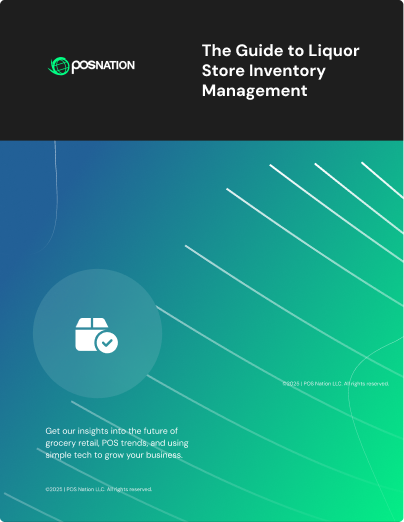So, you’re interested in starting a liquor store? Great! Before you start ringing in sales, know that the liquor industry is one of the most highly regulated industries in the world. In the U.S., liquor laws vary drastically by state or county, with alcohol control states being the most strict.
This can make even the simple act of securing a liquor license a complicated, costly, and confusing mess — even for a seasoned business owner.
To help you avoid unnecessary expenditures on the liquor license application (and renewal), we’ve created a quick-start guide that covers:
- What affects the cost of a liquor license
- The average cost by region
- An overview of the application process
- Four other factors to consider
Let’s dive in.
How Much Does a Liquor License Cost?
A liquor license is required to sell alcohol in every state. The cost of applying for a liquor license varies based on a few key factors:
- The type of business (e.g., a full-service bar vs. a liquor store)
- Your location (both the state, county, and city)
- The type of liquor license
To find the exact costs of an alcohol license in your state, contact your state’s liquor board or Alcohol Beverage Control (ABC) board.
Average Cost By Region
To give you a rough idea of what you might pay, we took all the available data on alcohol license costs in the U.S. to show you the average cost per region.

Here is the breakdown:
- Northeast: $1,600
- Midwest: $1,300
- South: $1,175
- West: $1,590
Important note: these numbers aren’t exact and are only meant to provide a ballpark to get you started.
The average cost for regions like the Northeast may appear lower because many states (like New York and Vermont) have highly variable licensing costs depending on the particulars of the business.
The national average cost for an alcohol license is between $1000 and $3000. Look to budget a minimum of $1500 for a liquor license.
Other Costs: Renewal Fees and Late Fees
For your liquor business to remain in good standing with the government, you’ll have to pay a renewal fee every 1-3 years. The cost of renewing a liquor license can range from just a few hundred dollars up to the cost of the permit itself.
However, the renewal process is generally more straightforward and less expensive than the initial application process.
As long as you haven’t sold to minors or gained a poor business reputation in your area, you should be able to get a liquor license renewal up to 90 days before or after it expires (depending on your state).
Sometimes local agencies provide reduced renewal fees for remaining in good standing with them throughout the year.
Last, don’t let your licensing slip — you’ll also have to pay penalty fees if you’re late. Penalty fees and surcharges can fall in the range of $100 to thousands of dollars, again, depending on license and area. Keep meticulous records and plan ahead for license renewals to avoid these extra costs and fees.
How To Apply for a Liquor License: An Overview
The process for applying for a liquor license varies based on location. We know — we sound like a broken record. However, it’s important to know the exact process for your state to save you time and avoid penalties.
That said, here’s roughly what to expect:
- Contact your state’s governing agency: Find out who the liquor authority is in your state. It’s a good idea to also contact your local government to see if there are other county or city-specific permits. Some areas require two licenses, one for the state and one for the local government.
- Figure out the type of license you need: There are different licenses if you sell just wine and beer, if customers drink alcohol in-store, or if you sell online, etc. Figure out which one is a fit for your business.
- Prepare and submit an application: Prepare any forms, documents, and other required information along with the application fee.
- Display your license: Once approved, you’ll be required to display your license in the store to show local authorities you are up to code.
Make sure you stay in good standing. Pay your renewal fees on time and train staff to check for IDs. Some states will regularly run sting operations to check liquor stores and restaurants that have gotten lax.
We highly recommend using a point of sale (POS) system that supports ID scanning to help you stay compliant and speed up the checkout process.
4 Additional Points To Consider When Applying for a Liquor License
Hopefully, you’re feeling a little more confident about the costs and process of getting your liquor license.
Here are four additional things to keep in mind.
1. Know Local Zoning Laws and Restrictions
A liquor license allows your business to sell alcohol. Zoning rules, on the other hand, dictate how land can be used. In some states, there are restrictions on where liquor stores, bars, and other businesses that sell alcohol can operate. When you open a liquor store, it’s important to research the area and make sure your dream location is viable.
For many states, that simply means understanding the zoning rules of your store’s location. Others are more complicated. For example, Alabama state law doesn’t allow any liquor stores or bars adjacent to schools, churches, and residential neighborhoods.
Some states also have outlet density laws, which prevent the opening of new liquor stores too close to existing ones. The best resource for zoning regulations will be your local government. You can also use the resources on the Small Business Administration website.
2. Get Your Other Licenses First
When you open a new liquor store, there’s a lot to do, and you might want to just get everything out of the way at once.
However, it’s important to tackle everything in steps to maximize your investment and avoid unforced errors. While it might make logical sense to get your business and liquor license together, most states need you to get some things squared away first.
As part of your application, you’ll usually need:
- Employee identification number (EIN)
- Business license
- Zoning permits
- Health permit
- Alcohol tax permit
Writing a liquor store business plan is a great way to keep yourself organized. A business plan will include all of the financial requirements and steps you need to take to get started, ensuring you stay on track.
3. See if Your State Allows Online Sales
Online liquor sales are a fantastic way to expand your reach to new customers and recapture the interest of old ones. However, what you can and can’t do varies considerably between states.
If you do plan to sell alcohol online and your state supports it, you’ll likely need additional licenses including:
- An e-commerce license
- A shipping license
Also, to sell liquor online you’ll need to use a high-risk payment processor. If you use a POS system that integrates with e-commerce, it may also be able to handle your online payments.
4. Get the Right Type of Liquor License
We’ve been talking pretty generally about “liquor licenses” — but what exactly do we mean? There are many types of liquor licenses depending on what type of business you run.
The first thing to know is the difference between on and off-premises licenses.
An on-premises liquor license allows customers to drink alcohol in your store. Common businesses that need some form of on-premises license are:
- Restaurants
- Bars
- Hotels
- Clubs
- Distilleries with tasting rooms
- Breweries
In some states, the type of liquor license and how much it costs will vary based on the type of business. So make sure to contact the local authorities to clarify exactly which license you need.
An off-premises liquor license is for liquor retailers that sell closed containers of alcohol to be consumed somewhere else. In other words, liquor and package stores.
Applying for a Liquor License Is Just the Start
Applying for a liquor license can be confusing, but it’s just the first step in a long journey. After you get all the paperwork out of the way, it’s time to actually build your business.
The right technology makes a big difference. Partner with a POS provider who truly understands the needs of liquor store owners. POS Nation is a top-rated POS system that gives small and mid-size businesses powerful tools to streamline every aspect of their business.
POS Nation also comes with many bonuses that make it ideal for liquor stores including ID scanning and high-risk payment processing in-house.
Contact us today to learn more about how POS Nation can help you boost sales, increase efficiency, and keep customers happy.









 by Cort Ouzts
by Cort Ouzts


 by Gina Obert
by Gina Obert